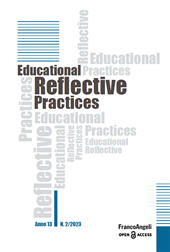Le discipline umanistiche e la riflessività : un connubio felice dalla scuola alla sanità
22-36 p.
Il contributo, partendo dal bisogno della società attuale di formare persone competenti per resilienza e autoregolazione (Pellerey, 2023), dopo aver brevemente tentato di esplicitare il significato di alcuni vocaboli inerenti alla riflessività e circoscritto quali aspetti di essa si è interessati a mettere in luce, introduce l'importanza dell'utilizzo di tutte le discipline umanistiche, portando alcuni esempi del loro impiego in contesti formativi all'apparenza molto distanti tra loro: quello medico e quello scolastico. Le tecniche utilizzate negli ultimi anni nell'ambito della formazione dei professionisti riflessivi sono molteplici e hanno ampiamente dimostrato la loro validità e utilità;.
nella formazione in itinere degli adulti, dove l'apprendimento trasformativo (Mezirow, 2016) si evidenzia sempre più come una via preferenziale per lo sviluppo di nuove competenze, gli educatori e i formatori sono alla ricerca di nuovi dispositivi didattici che possano favorire una pratica riflessiva nei discenti, aiutandoli a decifrare la gamma di significati che porta con sé la loro esperienza; in questo contesto si sta affermando una nuova attenzione alle discipline umanistiche e alla ricchezza dei loro contenuti e linguaggi. In ambito sanitario si è affermato fin dagli anni '60 il concetto delle Medical Humanities (Zannini, 2008), mentre in altri ambiti si utilizzano aspetti delle discipline umanistiche più o meno noti; l'intento del contributo è quello di realizzare una panoramica che evidenzi l'utilizzo di tutti i costrutti delle discipline umanistiche nell'ambito dei più diversi tipi di formazione riflessiva degli adulti, oltre ogni prospettiva settoriale.
Muovendo da tali intenti, si analizzano diversi dispositivi didattici "umanistici" e pratiche progettate e realizzate per promuovere la riflessività. All'interno di una molteplicità di proposte sia nell'area didattica che in quella sanitaria si è scelto di citare due percorsi formativi in particolare, per la ricchezza e varietà di dispositivi "umanistici" utilizzati. [Testo dell'editore].
The contribution, starting from the need of today's society to train competent people for resilience and self-regulation (Pellerey, 2023), after having briefly attempted to clarify the meaning of some words inherent in reflexivity and circumscribed which aspects of it we are interested in highlighting, introduces the importance of using all the humanities, bringing some examples of their use in training contexts that are apparently very distant from each other: the medical and the scholastic. The techniques used in recent years in the training of reflective professionals are many and have amply demonstrated their validity and usefulness;.
in ongoing adult education, where transformative learning (Mezirow, 2016) is increasingly highlighted as a preferential path for the development of new skills, educators and trainers are looking for new teaching devices that can foster reflective practice in learners, helping them to decipher the range of meanings that their experience brings; in this context, a new attention is being paid to the humanities and to the richness of their contents and languages. In the health sector, the concept of Medical Humanities (Zannini, 2008) has been affirmed since the 1960s, while in other fields more or less known aspects of the humanities are used; the intent of the contribution is to create an overview that denotes the use of all the constructs of the humanities in the context of the most diverse types of reflective training for adults, beyond any sectoral perspective.
Starting from these intentions, various "humanistic" teaching devices are analyzed and a series of practices designed and implemented to promote reflexivity are described. Within a multiplicity of proposals both in the didactic and in the health area, it was decided to mention two training courses in particular, due to the richness and variety of "humanistic" devices used. [Publisher's text].
Is part of
Educational reflective practices : 2, 2023-
Articles from the same issue (available individually)
-
Information
ISSN: 2279-9605
KEYWORDS
- Discipline umanistiche, Narratività, Medical humanities, Formazione docenti, Riflessività, Apprendimento trasformazionale
- Humanities, Narrative, Medical humanities, Teacher training, reflexivity, Transformative learning


